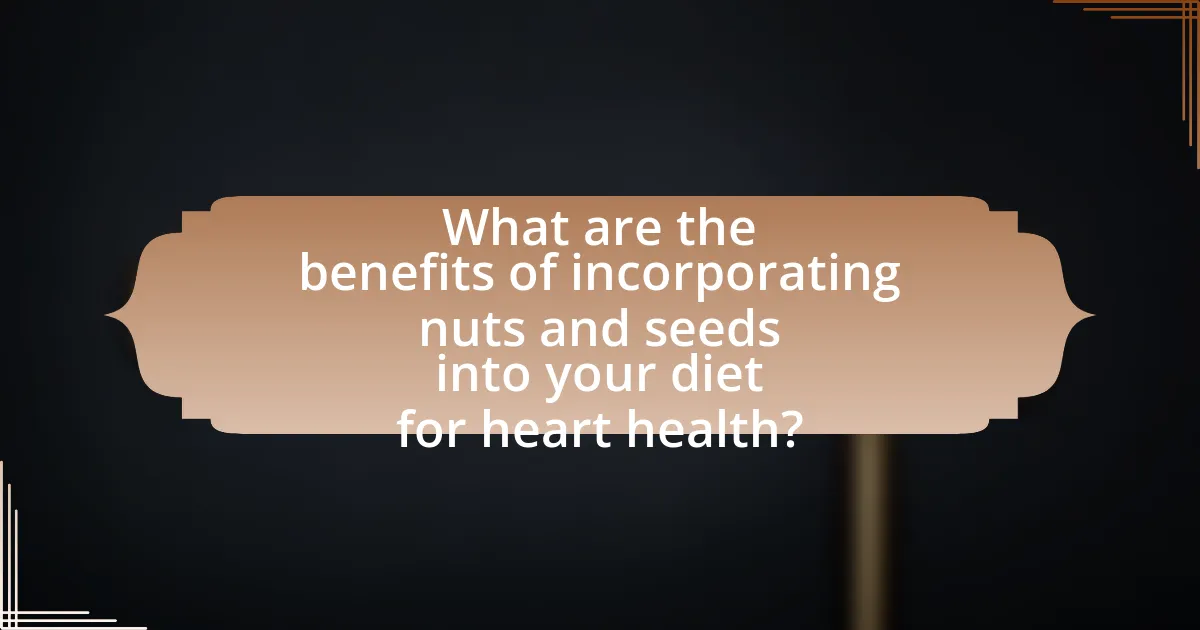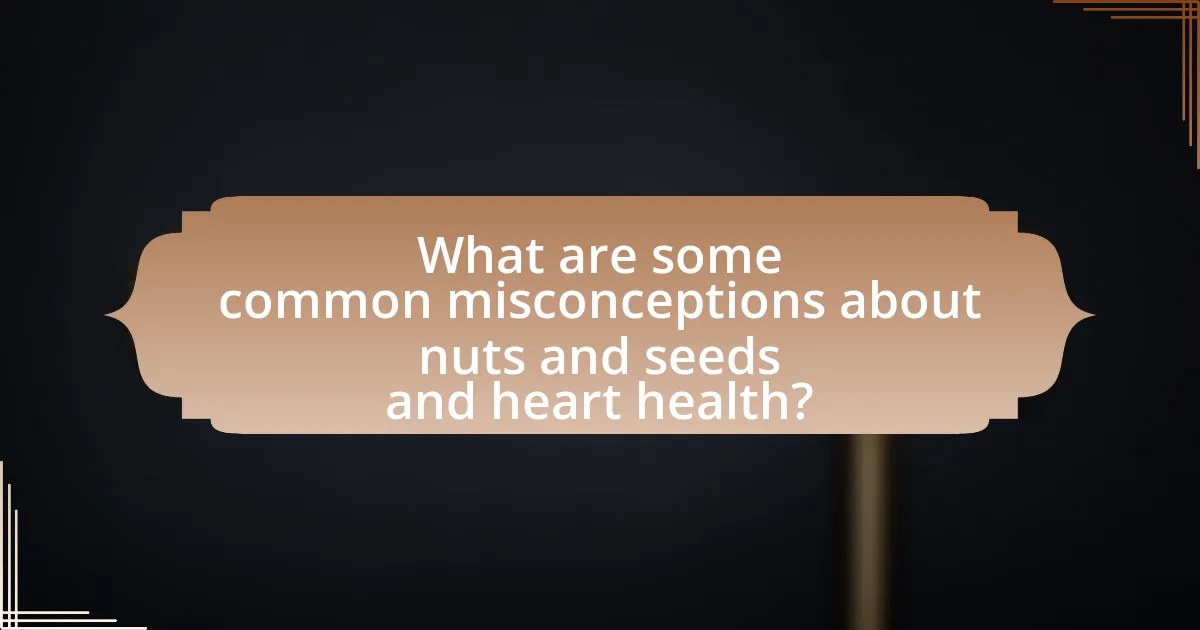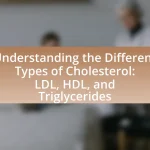Incorporating nuts and seeds into your diet is essential for improving heart health, as they are rich in unsaturated fats, fiber, antioxidants, and essential nutrients. Research indicates that regular consumption of these foods can significantly lower LDL cholesterol levels, reduce inflammation, and decrease the risk of cardiovascular diseases by up to 50%. Key nuts such as walnuts, almonds, and pistachios, along with seeds like flaxseeds and chia seeds, provide beneficial omega-3 fatty acids and antioxidants that support cardiovascular function. Practical tips for including these foods in daily meals, along with recommended portion sizes, are also discussed to help individuals enhance their heart health effectively.

What are the benefits of incorporating nuts and seeds into your diet for heart health?
Incorporating nuts and seeds into your diet significantly benefits heart health by reducing cholesterol levels and improving overall cardiovascular function. Studies indicate that nuts, such as almonds and walnuts, are rich in unsaturated fats, fiber, and antioxidants, which help lower LDL cholesterol and reduce inflammation. For instance, a meta-analysis published in the American Journal of Clinical Nutrition found that consuming nuts regularly is associated with a 30% reduction in the risk of heart disease. Additionally, seeds like flaxseeds and chia seeds provide omega-3 fatty acids, which are known to lower blood pressure and improve arterial function. These components collectively contribute to a healthier heart and lower the risk of cardiovascular diseases.
How do nuts and seeds contribute to cardiovascular health?
Nuts and seeds contribute to cardiovascular health by providing essential nutrients that improve heart function and reduce the risk of heart disease. They are rich in healthy fats, particularly monounsaturated and polyunsaturated fats, which help lower bad cholesterol levels. For instance, a study published in the American Journal of Clinical Nutrition found that consuming nuts regularly is associated with a 30-50% reduction in the risk of heart disease. Additionally, nuts and seeds are high in antioxidants, fiber, and plant sterols, which further support cardiovascular health by reducing inflammation and improving blood vessel function.
What specific nutrients in nuts and seeds promote heart health?
Nuts and seeds promote heart health primarily through their content of healthy fats, fiber, antioxidants, vitamins, and minerals. Specifically, monounsaturated fats and polyunsaturated fats, particularly omega-3 fatty acids found in walnuts and flaxseeds, help reduce inflammation and lower cholesterol levels. Additionally, fiber aids in lowering blood pressure and improving overall heart health. Antioxidants, such as vitamin E in almonds and selenium in Brazil nuts, protect against oxidative stress, which can damage blood vessels. Studies, including one published in the Journal of the American College of Cardiology, indicate that regular consumption of nuts and seeds is associated with a reduced risk of cardiovascular disease, reinforcing the importance of these nutrients for heart health.
How do antioxidants in nuts and seeds affect heart disease risk?
Antioxidants in nuts and seeds significantly reduce heart disease risk by combating oxidative stress and inflammation, which are key contributors to cardiovascular issues. Research indicates that the high levels of antioxidants, such as vitamin E and polyphenols found in almonds, walnuts, and flaxseeds, help protect blood vessels and improve endothelial function. A study published in the Journal of Nutrition found that regular consumption of nuts is associated with a lower risk of heart disease, with participants experiencing a 30-50% reduction in cardiovascular events. This evidence underscores the protective role of antioxidants in nuts and seeds against heart disease.
What types of nuts and seeds are best for heart health?
Walnuts, almonds, flaxseeds, and chia seeds are among the best nuts and seeds for heart health. Walnuts are rich in omega-3 fatty acids, which have been shown to reduce inflammation and lower blood pressure. Almonds contain high levels of vitamin E and magnesium, both of which contribute to cardiovascular health by improving blood vessel function. Flaxseeds are an excellent source of alpha-linolenic acid (ALA), a type of omega-3 fatty acid that can help lower cholesterol levels. Chia seeds are also high in ALA and provide fiber, which can aid in maintaining healthy cholesterol levels. Studies, such as one published in the Journal of the American College of Cardiology, have demonstrated that regular consumption of these nuts and seeds can significantly reduce the risk of heart disease.
Which nuts are particularly beneficial for heart health?
Walnuts, almonds, and pistachios are particularly beneficial for heart health. Walnuts are rich in omega-3 fatty acids, which have been shown to reduce inflammation and lower blood pressure. Almonds contain high levels of vitamin E and magnesium, both of which contribute to improved cardiovascular health by reducing cholesterol levels. Pistachios are known to lower LDL cholesterol and improve blood vessel function due to their high antioxidant content. Studies, such as one published in the American Journal of Clinical Nutrition, have demonstrated that regular consumption of these nuts can significantly lower the risk of heart disease.
What seeds should be included for optimal cardiovascular benefits?
Flaxseeds, chia seeds, and pumpkin seeds should be included for optimal cardiovascular benefits. Flaxseeds are rich in omega-3 fatty acids, which have been shown to reduce inflammation and lower blood pressure. Chia seeds provide a high amount of fiber and antioxidants, contributing to improved cholesterol levels. Pumpkin seeds contain magnesium, which is essential for heart health and helps regulate blood pressure. Studies indicate that incorporating these seeds into the diet can significantly enhance cardiovascular health by improving lipid profiles and reducing the risk of heart disease.

How can you effectively incorporate nuts and seeds into your daily meals?
To effectively incorporate nuts and seeds into daily meals, add them to breakfast, snacks, salads, and main dishes. For breakfast, sprinkle almonds or chia seeds on yogurt or oatmeal to enhance nutrition and flavor. As snacks, consume a handful of walnuts or pumpkin seeds for a heart-healthy option. In salads, mix in sunflower seeds or pine nuts to increase crunch and healthy fats. For main dishes, use ground flaxseeds in smoothies or incorporate cashews into stir-fries. Research indicates that regular consumption of nuts and seeds can lower cholesterol levels and reduce heart disease risk, supporting their inclusion in a heart-healthy diet.
What are some easy ways to add nuts and seeds to your diet?
To easily add nuts and seeds to your diet, incorporate them into meals and snacks by mixing them into yogurt, oatmeal, or salads. For example, adding a handful of almonds or chia seeds to your morning oatmeal can enhance both flavor and nutrition. Research indicates that consuming nuts and seeds can improve heart health due to their high content of healthy fats, fiber, and antioxidants. A study published in the American Journal of Clinical Nutrition found that regular nut consumption is associated with a reduced risk of cardiovascular disease.
How can you use nuts and seeds in breakfast options?
Nuts and seeds can be incorporated into breakfast options by adding them to smoothies, oatmeal, yogurt, or baked goods. For instance, blending almonds or chia seeds into a smoothie enhances nutritional value and provides healthy fats. Adding walnuts or flaxseeds to oatmeal increases fiber and omega-3 content, which are beneficial for heart health. Furthermore, sprinkling pumpkin seeds on yogurt not only adds crunch but also boosts protein intake. Research indicates that regular consumption of nuts and seeds can lower cholesterol levels and reduce the risk of heart disease, supporting their inclusion in breakfast meals.
What are some creative snacks that include nuts and seeds?
Creative snacks that include nuts and seeds are energy bars, trail mix, nut butter on fruit, and seed crackers. Energy bars often combine various nuts and seeds with oats and natural sweeteners, providing a nutritious option for on-the-go snacking. Trail mix typically features a blend of nuts, seeds, and dried fruits, offering a balance of healthy fats, protein, and fiber. Nut butter spread on apple slices or bananas delivers a satisfying combination of flavors and nutrients. Seed crackers, made from ground seeds like flax or chia, serve as a crunchy, gluten-free snack alternative. These snacks not only enhance heart health due to the beneficial fats and nutrients found in nuts and seeds but also provide sustained energy throughout the day.
What portion sizes are recommended for nuts and seeds?
The recommended portion sizes for nuts and seeds are typically one ounce, which is approximately 28 grams. This portion size is supported by dietary guidelines that suggest consuming a variety of nuts and seeds as part of a balanced diet for heart health. Research indicates that consuming this amount can provide beneficial nutrients, including healthy fats, protein, and fiber, which contribute to cardiovascular health. For example, a study published in the American Journal of Clinical Nutrition found that regular consumption of nuts is associated with a reduced risk of heart disease, reinforcing the importance of adhering to recommended portion sizes.
How can you measure appropriate serving sizes for heart health?
To measure appropriate serving sizes for heart health, use the standard guideline of one ounce for nuts and seeds, which is roughly equivalent to a small handful or about 28 grams. This serving size is supported by research indicating that consuming one ounce of nuts daily can reduce the risk of heart disease by up to 30% due to their healthy fats, fiber, and antioxidants. For example, a study published in the American Journal of Clinical Nutrition found that participants who included nuts in their diet experienced improved lipid profiles and reduced inflammation, both of which are crucial for heart health.
What are the potential risks of overconsumption of nuts and seeds?
Overconsumption of nuts and seeds can lead to several potential risks, including excessive calorie intake, digestive issues, and nutrient imbalances. Consuming large quantities of nuts and seeds can significantly increase daily caloric intake, potentially leading to weight gain; for example, a 100-gram serving of mixed nuts can contain around 600 calories. Additionally, high fiber content in nuts and seeds may cause digestive discomfort, such as bloating or gas, especially when consumed in excess. Furthermore, an imbalance in omega-3 and omega-6 fatty acids may occur, as many nuts and seeds are high in omega-6, which can promote inflammation if not balanced with omega-3 intake.

What are some common misconceptions about nuts and seeds and heart health?
Common misconceptions about nuts and seeds and heart health include the belief that they are too high in fat to be heart-healthy and that consuming them leads to weight gain. In reality, nuts and seeds contain healthy unsaturated fats, which can improve cholesterol levels and reduce heart disease risk. Research published in the American Journal of Clinical Nutrition indicates that regular nut consumption is associated with a lower risk of cardiovascular disease, highlighting their beneficial role in heart health. Additionally, studies show that incorporating nuts and seeds into a balanced diet can aid in weight management, as they promote satiety and reduce overall calorie intake.
Why do some people avoid nuts and seeds despite their benefits?
Some people avoid nuts and seeds due to allergies, digestive issues, or concerns about calorie content. Allergies to nuts, particularly peanuts and tree nuts, affect approximately 1-2% of the population, leading individuals to eliminate these foods entirely for safety. Additionally, some individuals experience gastrointestinal discomfort when consuming nuts and seeds, which can deter them from including these foods in their diet. Concerns about high calorie density also play a role; nuts and seeds are energy-dense foods, and those managing weight may avoid them despite their health benefits.
What myths exist regarding the fat content in nuts and seeds?
Myths regarding the fat content in nuts and seeds often suggest that these foods are unhealthy due to their high fat content. However, research indicates that the fats found in nuts and seeds are primarily unsaturated fats, which are beneficial for heart health. For instance, a study published in the American Journal of Clinical Nutrition found that regular consumption of nuts is associated with a reduced risk of cardiovascular disease, highlighting their role in a heart-healthy diet. Additionally, another myth claims that eating nuts leads to weight gain; however, studies show that nuts can promote satiety and may aid in weight management when consumed in moderation.
How can understanding the truth about nuts and seeds change dietary choices?
Understanding the truth about nuts and seeds can significantly influence dietary choices by highlighting their nutritional benefits and potential health risks. For instance, nuts and seeds are rich in healthy fats, protein, fiber, vitamins, and minerals, which contribute to heart health and overall well-being. Research published in the American Journal of Clinical Nutrition indicates that regular consumption of nuts is associated with a reduced risk of cardiovascular disease, as they can lower LDL cholesterol levels and improve endothelial function. Additionally, understanding the caloric density of nuts and seeds can help individuals make informed portion choices, preventing excessive calorie intake while still reaping their health benefits. This knowledge empowers consumers to incorporate these foods into their diets more effectively, promoting better heart health.
What practical tips can help you incorporate nuts and seeds into your diet?
To incorporate nuts and seeds into your diet, start by adding a handful of mixed nuts or seeds to your breakfast, such as oatmeal or yogurt. This practice not only enhances flavor but also boosts nutrient intake, as nuts and seeds are rich in healthy fats, protein, and fiber. Additionally, use nut butters as spreads on whole-grain toast or in smoothies for added creaminess and nutrition. Research indicates that consuming nuts regularly can lower cholesterol levels and reduce heart disease risk, making them a beneficial addition to your diet. Furthermore, sprinkle seeds like chia or flaxseed on salads or in baked goods to increase omega-3 fatty acids and antioxidants. These practical tips facilitate easy integration of nuts and seeds into daily meals, promoting better heart health.










